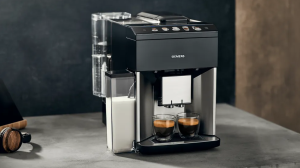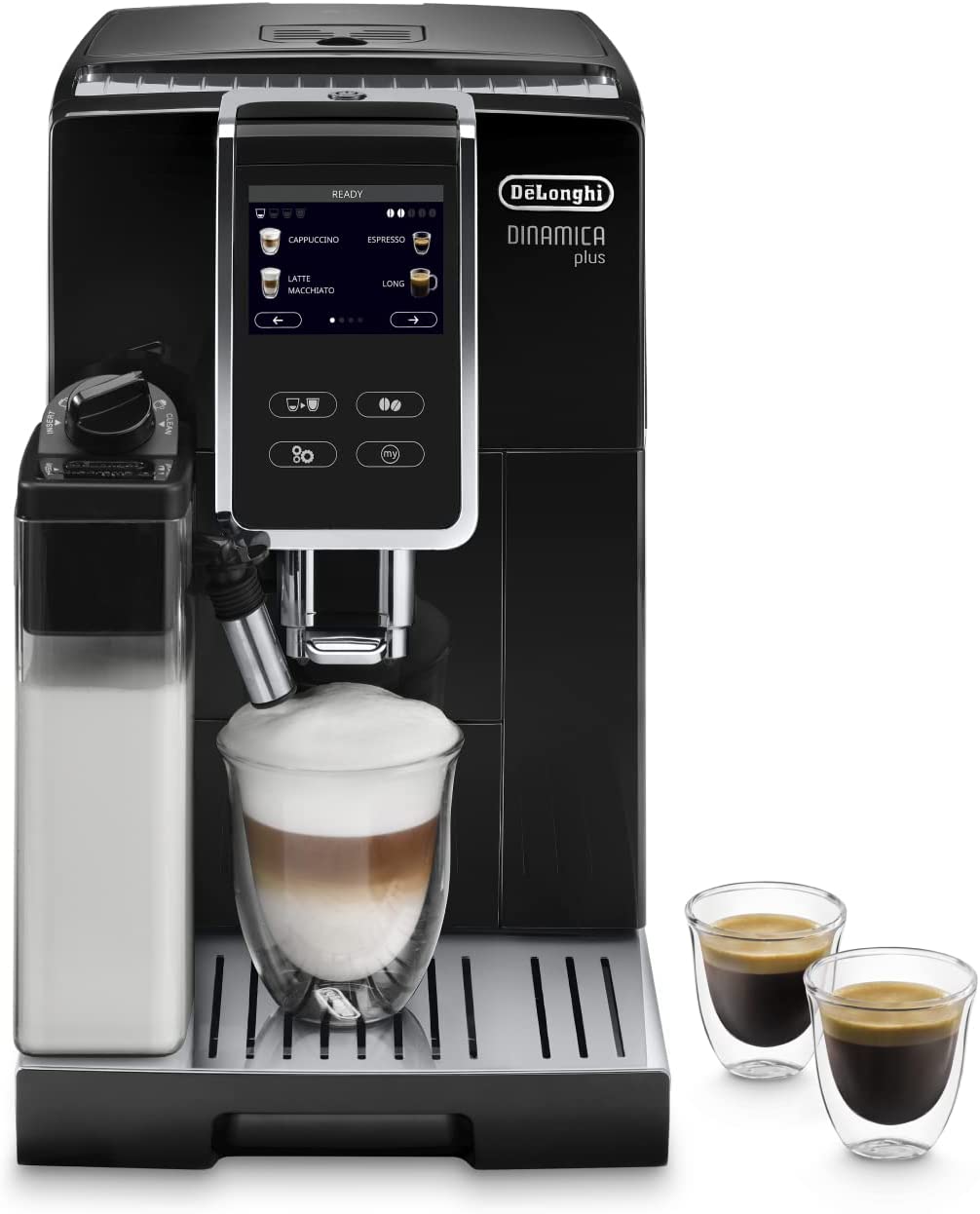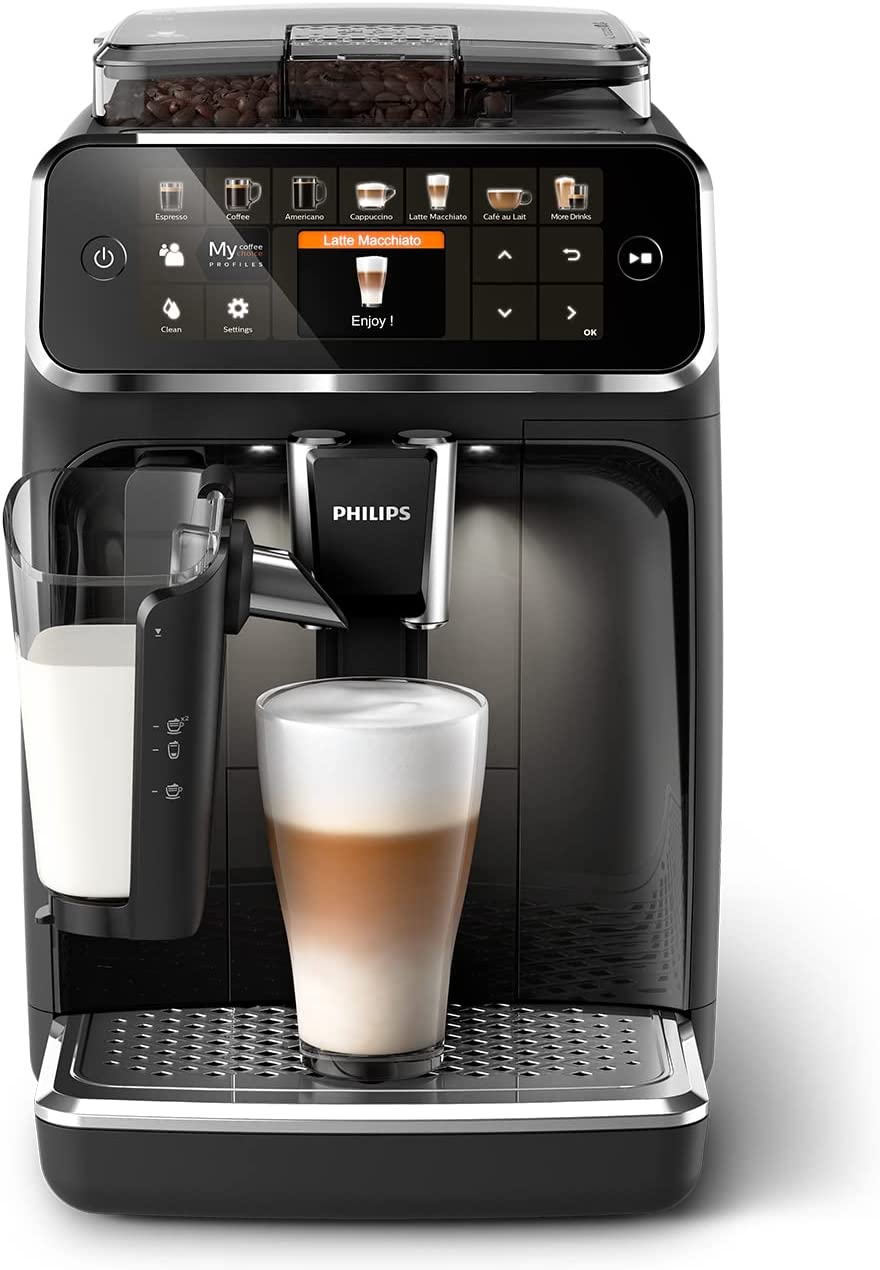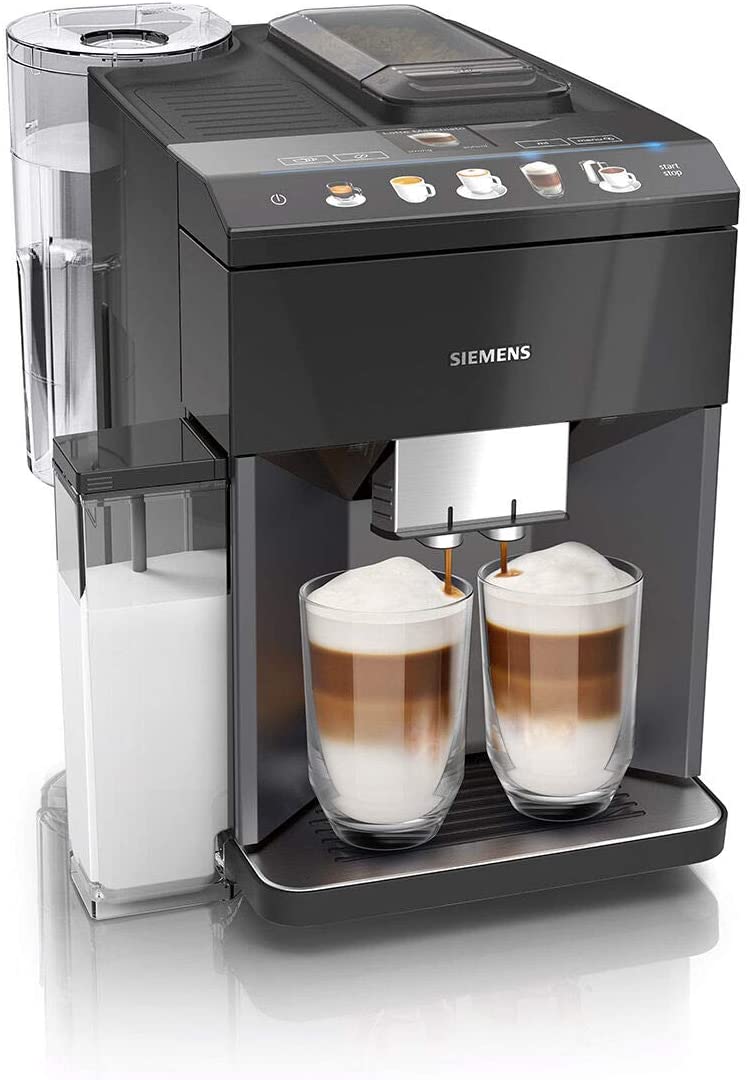|
Our favourite! De’Longhi Dinamica+
Pressure: 19 bars |
Great recommendation! Philips 5400 Series
Pressure: 15 bars |
Good opinions! Siemens EQ.500
Pressure: 15 bars |
The coffee culture continues to boom, and more and more of us are not satisfied with any type of coffee. For this reason, it is very common to resort to high-end professional coffee machines that, although they involve a higher investment, offer results worthy of the best baristas. Today we show you a comparison between three of the leading brands in the coffee market: De’Longhi vs Philips vs Siemens. As you can see, there are three great titans, but which one is more worth it?
The three brands have a long history and experience in the design and manufacture of automatic and super-automatic coffee machines. The most important thing is to know how to identify the most relevant strengths of each one and, in this way, choose the most appropriate one. To do this, we are going to take three automatic coffee machines with integrated milk system as a reference , although we will also analyze the strengths of each brand at a generic level.
The type of grinder is, for example, one of the most marked differences between the three brands. On the other hand, we cannot ignore the reputation of each brand. De’Longhi is the one with the greatest degree of specialization solely in coffee makers, as Philips and Siemens are more often associated with other types of appliances besides coffee makers. However, one of the main qualities of Philips is its high degree of technology, something that is also reflected in its coffee machines.
If you want to know in more detail what are the strengths of the three brands of coffee makers to find out which one could be closer to your preferences, keep reading!
De’Longhi vs Philips vs Siemens – Comparison Table
We show you a table in which we reflect the main specifications of three of the most complete automatic coffee machines with integrated milk system of each brand:
(Slide the table to see all the content)
De’Longhi Dinamica+
|
Philips 5400 Series
|
Siemens EQ.500
|
|
| Dimensions | 23,6 x 42,9 x 34,8 cm | 24,6 x 37,2 x 43,3 cm | 37,3 x 31,8 x 45,2 cm |
| Weight | 9,5 kg | 8 kg | 8,7 kg |
| Power | 1450 watts (W) | 1500 watts (W) | 1500 watts (W) |
| Pressure | 19 bars | 15 bars | 15 bars |
| Water tank capacity | 1.8 liters | 1.8 liters | 1.7 liters |
| Grain container capacity | 300 grams | 275 grams | 270 grams |
| Grinder type | conical steel | Ceramics | Ceramics |
| Grinding levels | 13 | 12 | 3 |
| Ground coffee tank | Yes | Yes | Yes |
| Screen | TFT touch | TFT Touch | TFT Touch |
| Milk system | LatteCrema System | LatteGo | autoMilk |
| Built-in milk jug | Yes | Yes | Yes |
| Double exit coffee without milk | Yes | Yes | Yes |
| Double exit coffee with milk | No | No | Yes |
| Intensity levels | 5 | 5 | 5 |
| Variety of drinks | 12 | 12 | 9 |
| Custom drinks | Yes | Yes | Yes |
| Automatic cleaning | Yes | Yes | Yes |
Pressure as a starting point

As you will see, it is really difficult to make a generic comparison of three brands that have such a wide catalog of automatic coffee machines. Therefore, one of the concepts that can serve as a starting point is to check aspects such as power and pressure. In the first case, the truth is that there are usually not many differences, since most coffee makers range between 1,450 and 1,500 watts (the difference is a purely theoretical matter).
On the other hand, with regard to pressure, we can notice some more variation. De’Longhi designs coffee makers that have a higher maximum pressure level than Philips and Siemens, reaching up to 19 bars. Although, to be honest, the 15 bars that Philips and Siemens coffee machines have are more than enough to make good coffee, although De’Longhi is a level above.
Interestingly, there is also variation between De’Longhi and its two rivals when it comes to the grinder. In the coffee makers of this brand, the grinder is made of stainless steel, while the one used by Philips and Siemens is ceramic. Honestly, here we have not found differences in the result of the coffee, beyond the levels of grinding. We admit that it seems quite strange to us that the Siemens coffee maker has only 3 levels, taking into account that the most common in high-end coffee makers is that they have between 12 and 13.
Coffees with milk foam, another big difference
All three coffee maker brands have models with integrated milk systems, and it is on those that we have focused. Now, is the milk system the same? Yes and no. We explain ourselves . The operation is practically the same in all three cases: a milk tank integrated into the left side of the coffee maker, with which cappuccino or latte-type coffees are made. However, there are small differences that make Siemens our winner in this case.

What has convinced us the most is that only Siemens coffee machines can make two lattes at the same time. As you know, both De’Longhi and Philips have a double coffee outlet and can prepare two coffees at the same time, but as long as they are espressos. On the other hand, they cannot pour two lattes at the same time, something that the Siemens coffee maker can do.
As for the quality of the milk foam, the truth is that it is excellent in all three cases. However, if you allow us to give our opinion, the density of the milk cream that the De’Longhi machines have seems sublime to us.
The capacity of the deposits, to examination
Another aspect that can influence the decision of which coffee maker to buy is the capacity of its deposits. And we are referring to both the water tank and the coffee bean tank, although the three brands move in a similar range in both cases. De’Longhi and Philips have 1.8-litre water tanks, which Siemens reduces to 1.7 litres. And when it comes to coffee bean containers, all three brands range from 270 to 300 grams, so it’s not a difference to be definitive.
Above all, taking into account that all three also allow you to make coffee using already ground coffee, and that all three have a milk tank included. At this point, we can say that there is a technical draw.
Customization level: De’Longhi is the winner

When we talk about the degree of customization, we are not referring to a single specific aspect, but to several. First of all, you have to check the variety of drinks that are in each coffee maker. In this sense, De’Longhi and Philips are pretty even, with Siemens lagging a bit behind. Of course, the three brands have an option through which they allow the coffee to be adjusted as we like it in a totally personalized way, and that is an advantage.
On the other hand, you have to look at the levels of intensity in the aroma, something in which the three brands are tied. And, as we have anticipated before, the grinding levels that we can choose are also important, because the texture and density of the coffee will depend on it.
Taking all the variables into account, the brand that convinces us the most is De’Longhi, followed closely by Philips. Instead, Siemens could improve on more points when it comes to customizing its coffee machines.
De’Longhi vs. Philips vs. Siemens: Strengths
Before sharing our conclusion with you, we want to briefly show you the main strengths of each of the coffee machines on which we have focused this comparison. This will help you to see reflected all the generic qualities that we have talked about.
De’Longhi Dinamica Plus: Small perfect details
In short, this De’Longhi coffee maker is the clear example that near perfection exists. Its 19 bars of pressure, added to the 12 levels of grinding and the 5 degrees of intensity make the coffee it makes super aromatic and intense. In addition, the LatteCrema system complements the coffees with a cream whose density is almost cut with a knife, although it cannot make two lattes at the same time. In addition, innovation is more than present in its 3.5-inch TFT touch screen, one of the largest on the market.
Philips 5400: Good value for money

The second coffee maker that we have analyzed is the one with the most attractive value for money . It has 15 bars of pressure and 1500 watts of power. And, as in the De’Longhi, we can choose between 12 grinding levels and 5 intensities. However, in this case, the grinder is ceramic. Likewise, it has 4 user profiles to customize the drinks, in case we don’t like any of the 12 drinks from which we can choose.
Siemens EQ.500: Ideal for lovers of coffee with milk
Finally, we will tell you about some of the main advantages of the Siemens coffee maker. What we like most about it is the possibility of making two lattes at the same time, which makes it a great alternative for those who usually drink this type of coffee regularly. Although it has fewer varieties of drinks to choose from through its touch screen, it has a customization option, and that means that we can configure the coffee just the way we like it.
De’Longhi vs. Philips vs. Siemens: Our conclusion
Honestly, any of the three brands featured in this review have high-end professional coffee makers, and with any of their models you will get a very high-quality coffee. But, if we get exquisite, we must tell you that De’Longhi is the one that takes perfect care of the small details that make the difference. At least from our point of view. The density of the milk cream, the small increase in pressure or the large size of the screen are three of the characteristics that make the user experience better in general.
Siemens, by contrast, has some very positive qualities, but others where it lags further behind Philips and De’Longhi. And, in the case of Philips, it is the one with the most interesting balance between price and quality. Therefore, think about what are, for you, the most relevant qualities and, based on them, choose the one that best suits them. Of course, you can rest assured that, whatever you choose, you will be right.



